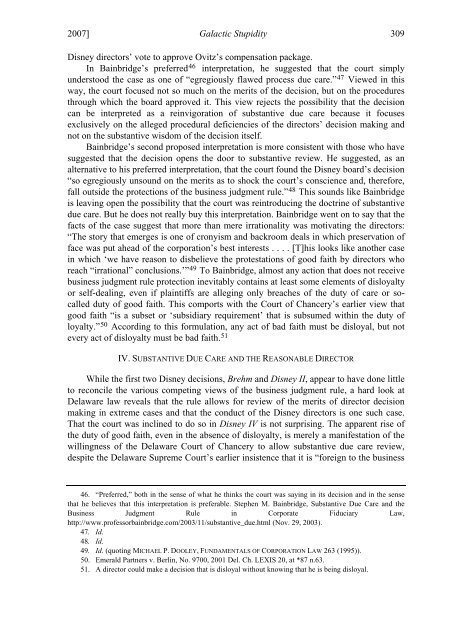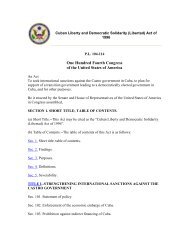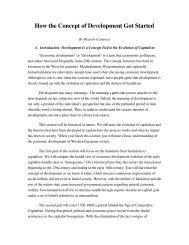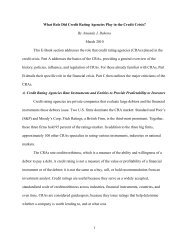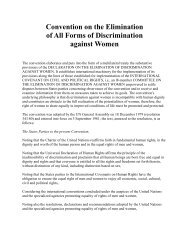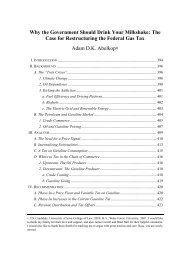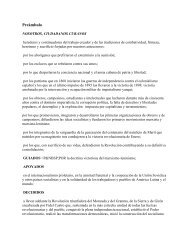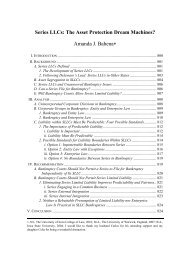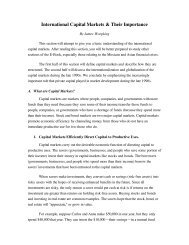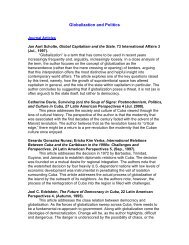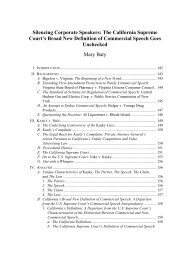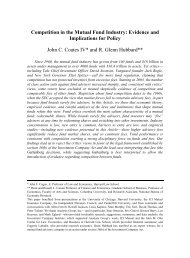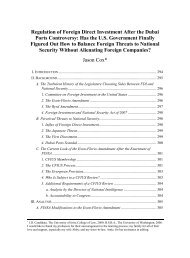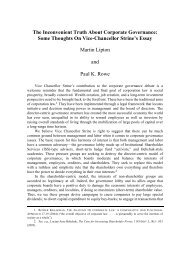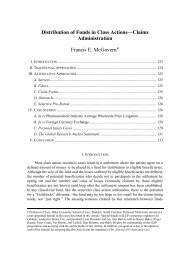Galactic Stupidity and the Business Judgment Rule - College of Law
Galactic Stupidity and the Business Judgment Rule - College of Law
Galactic Stupidity and the Business Judgment Rule - College of Law
You also want an ePaper? Increase the reach of your titles
YUMPU automatically turns print PDFs into web optimized ePapers that Google loves.
2007] <strong>Galactic</strong> <strong>Stupidity</strong> 309<br />
Disney directors’ vote to approve Ovitz’s compensation package.<br />
In Bainbridge’s preferred 46 interpretation, he suggested that <strong>the</strong> court simply<br />
understood <strong>the</strong> case as one <strong>of</strong> “egregiously flawed process due care.” 47 Viewed in this<br />
way, <strong>the</strong> court focused not so much on <strong>the</strong> merits <strong>of</strong> <strong>the</strong> decision, but on <strong>the</strong> procedures<br />
through which <strong>the</strong> board approved it. This view rejects <strong>the</strong> possibility that <strong>the</strong> decision<br />
can be interpreted as a reinvigoration <strong>of</strong> substantive due care because it focuses<br />
exclusively on <strong>the</strong> alleged procedural deficiencies <strong>of</strong> <strong>the</strong> directors’ decision making <strong>and</strong><br />
not on <strong>the</strong> substantive wisdom <strong>of</strong> <strong>the</strong> decision itself.<br />
Bainbridge’s second proposed interpretation is more consistent with those who have<br />
suggested that <strong>the</strong> decision opens <strong>the</strong> door to substantive review. He suggested, as an<br />
alternative to his preferred interpretation, that <strong>the</strong> court found <strong>the</strong> Disney board’s decision<br />
“so egregiously unsound on <strong>the</strong> merits as to shock <strong>the</strong> court’s conscience <strong>and</strong>, <strong>the</strong>refore,<br />
fall outside <strong>the</strong> protections <strong>of</strong> <strong>the</strong> business judgment rule.” 48 This sounds like Bainbridge<br />
is leaving open <strong>the</strong> possibility that <strong>the</strong> court was reintroducing <strong>the</strong> doctrine <strong>of</strong> substantive<br />
due care. But he does not really buy this interpretation. Bainbridge went on to say that <strong>the</strong><br />
facts <strong>of</strong> <strong>the</strong> case suggest that more than mere irrationality was motivating <strong>the</strong> directors:<br />
“The story that emerges is one <strong>of</strong> cronyism <strong>and</strong> backroom deals in which preservation <strong>of</strong><br />
face was put ahead <strong>of</strong> <strong>the</strong> corporation’s best interests . . . . [T]his looks like ano<strong>the</strong>r case<br />
in which ‘we have reason to disbelieve <strong>the</strong> protestations <strong>of</strong> good faith by directors who<br />
reach “irrational” conclusions.’” 49 To Bainbridge, almost any action that does not receive<br />
business judgment rule protection inevitably contains at least some elements <strong>of</strong> disloyalty<br />
or self-dealing, even if plaintiffs are alleging only breaches <strong>of</strong> <strong>the</strong> duty <strong>of</strong> care or socalled<br />
duty <strong>of</strong> good faith. This comports with <strong>the</strong> Court <strong>of</strong> Chancery’s earlier view that<br />
good faith “is a subset or ‘subsidiary requirement’ that is subsumed within <strong>the</strong> duty <strong>of</strong><br />
loyalty.” 50 According to this formulation, any act <strong>of</strong> bad faith must be disloyal, but not<br />
every act <strong>of</strong> disloyalty must be bad faith. 51<br />
IV. SUBSTANTIVE DUE CARE AND THE REASONABLE DIRECTOR<br />
While <strong>the</strong> first two Disney decisions, Brehm <strong>and</strong> Disney II, appear to have done little<br />
to reconcile <strong>the</strong> various competing views <strong>of</strong> <strong>the</strong> business judgment rule, a hard look at<br />
Delaware law reveals that <strong>the</strong> rule allows for review <strong>of</strong> <strong>the</strong> merits <strong>of</strong> director decision<br />
making in extreme cases <strong>and</strong> that <strong>the</strong> conduct <strong>of</strong> <strong>the</strong> Disney directors is one such case.<br />
That <strong>the</strong> court was inclined to do so in Disney IV is not surprising. The apparent rise <strong>of</strong><br />
<strong>the</strong> duty <strong>of</strong> good faith, even in <strong>the</strong> absence <strong>of</strong> disloyalty, is merely a manifestation <strong>of</strong> <strong>the</strong><br />
willingness <strong>of</strong> <strong>the</strong> Delaware Court <strong>of</strong> Chancery to allow substantive due care review,<br />
despite <strong>the</strong> Delaware Supreme Court’s earlier insistence that it is “foreign to <strong>the</strong> business<br />
46. “Preferred,” both in <strong>the</strong> sense <strong>of</strong> what he thinks <strong>the</strong> court was saying in its decision <strong>and</strong> in <strong>the</strong> sense<br />
that he believes that this interpretation is preferable. Stephen M. Bainbridge, Substantive Due Care <strong>and</strong> <strong>the</strong><br />
<strong>Business</strong> <strong>Judgment</strong> <strong>Rule</strong> in Corporate Fiduciary <strong>Law</strong>,<br />
http://www.pr<strong>of</strong>essorbainbridge.com/2003/11/substantive_due.html (Nov. 29, 2003).<br />
47. Id.<br />
48. Id.<br />
49. Id. (quoting MICHAEL P. DOOLEY, FUNDAMENTALS OF CORPORATION LAW 263 (1995)).<br />
50. Emerald Partners v. Berlin, No. 9700, 2001 Del. Ch. LEXIS 20, at *87 n.63.<br />
51. A director could make a decision that is disloyal without knowing that he is being disloyal.


